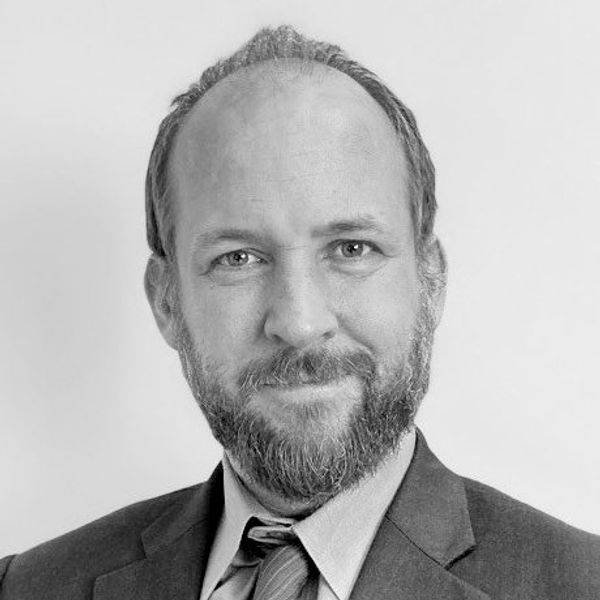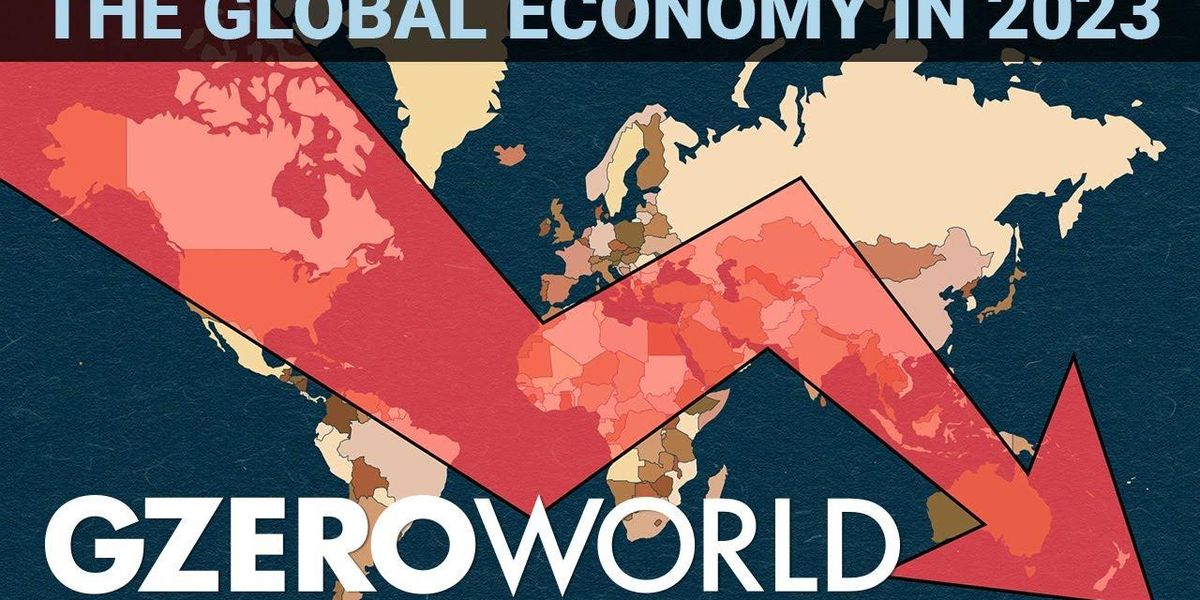Trending Now
We have updated our Privacy Policy and Terms of Use for Eurasia Group and its affiliates, including GZERO Media, to clarify the types of data we collect, how we collect it, how we use data and with whom we share data. By using our website you consent to our Terms and Conditions and Privacy Policy, including the transfer of your personal data to the United States from your country of residence, and our use of cookies described in our Cookie Policy.
{{ subpage.title }}
Gloom could spell doom for Biden and Trudeau
Voters from the Rio Grande to the Arctic are deeply pessimistic about the economy, which means both Justin Trudeau and Joe Biden are facing an uphill battle for reelection.
The horse race polls are worrying for both men. Some 56% of Americans disapprove of the US president, while only 39% approve, and a recent NYT/Siena poll shows him trailing Donald Trump in five of six battleground states. Trudeau’s approval rating is worse — only 33% approve of him, while 61% disapprove. He has trailed the opposition Conservatives by double digits in polls for months.
But polls about the economy contain even worse news for both leaders. History shows that incumbents typically suffer when voters believe bad times are ahead – a lesson Jimmy Carter and George H.W. Bush learned the hard way. Trouble is, that is exactly what today’s voters think right now in both Canada and the US, says pollster Quito Maggi, of Mainstreet Research, a Canadian firm that polls in both countries.
“In both Canada and the US, it's about a net negative 20, people saying they're pessimistic versus optimistic” about their own personal financial prospects in the months ahead.
“What we found in the past is when we ask people about their own personal financial circumstances, they tend to be more optimistic than they are about the global economy or the economy of the country or a region. So it's pretty bad when it's that bad.”
Reality versus perception
In the United States, the actual economic indicators are mixed. Unemployment numbers are not terrible – employers added 150,000 jobs in October, but that was lower than expected – but voters are intensely focused on affordability. The latest numbers show inflation declining, but that doesn’t mean prices are going down fast enough, and there is no guarantee that voters will decide life is more affordable by late next year.
A new poll conducted for the Financial Times shows that only 14% of Americans think Biden has made them better off, which is historically a crucial test for voters come election time. In comparison, in November 2019, when Biden was campaigning for the job, 35% thought they were better off after four years of Trump.
“Biden is not getting in any way sort of credit for … the resilience of the US economy,” says Graeme Thompson, a senior analyst with Eurasia Group's global macro-geopolitics practice. “Everybody thought that if you were going to raise rates this quickly, there would be a downturn or softening growth of some variety much sooner if not a pretty significant one.”
Instead, the economy is proving to be resilient, but voters are not attributing that to Biden. Whatever else is happening in the contest — and next year’s presidential race looks less predictable than most — Biden had better hope voters are more optimistic by November.
Canadian mortgage shock
The underlying economic facts are tougher for Trudeau, whose polling is going from bad to worse. Trudeau’s position looks more precarious because a massive mortgage price shock is on the way. About 45% of Canadian mortgage holders face renewal under sharply higher rates in the next two years, the Canada Mortgage and Housing Corporation warned last week. Sales slowed down in October, and prices have softened. If the trend continues, homeowners who bought at the top of the market could end up paying more than they can afford for properties that are losing value.
Central banks in both countries have boosted rates to try to bring down inflation, but more Americans have 30-year, locked-in mortgages, so Canadians are more vulnerable to rate increases.
Still, voters in both countries are focused on their pocketbooks.
“Housing affordability is number one, food and other general affordability is number two, both in Canada and the US,” says Maggi. “It's been a long time since we've seen economic issues at the top of the ballot, and I really can't remember the last time that it was this prominent.”
People with modest incomes find it hard to focus on anything else when they are struggling to pay for shelter and sustenance, says Thompson. “Those are things that take up a majority of people's capacity to pay and are a higher percentage of household expenditures the poorer you are.”
A recent study by Eurasia Group found that in 57 inflation shocks since 1970, governments turned over in 58% of cases.
There is no reason to think Biden and Trudeau can beat the odds, says Thompson.
“The combination of slow growth on the one hand, and sticky inflation and cost of living pressures on the other is toxic for incumbents.”
World Bank's David Malpass on global debt & economic inequality
The world has a huge debt problem. Economic growth is slowing, but global debt is skyrocketing.
David Malpass sits down with Ian Bremmer on GZERO World for his final interview as president of the World Bank Group to discuss the debt crisis, his tenure at the World Bank, and solutions for combatting growing economic inequality.
Global debt has ballooned in the last two decades to an eye-watering $300 trillion due to years of low interest rates and cheap goods that made money easy to borrow. Then, along came the pandemic which stalled growth and a war in Ukraine that shot up food and energy prices, leading to runaway global inflation.
Rich countries reacted by injecting trillions of dollars of stimulus money into their economies, borrowing huge sums in order to do so.
"So much more of the world's capital is going just to pay off the debt of the advanced economies," Malpass warns, "That leaves less for everybody else, and I think that's a grave concern."
Malpass also spoke about China's emergence in the 21st century as the world's creditor, his proudest accomplishments as World Bank president, and advice for his successor, Ajay Banga. He also points to countries like India and Indonesia, which he believes are poised for significant economic expansion.
Can the world solve the global debt crisis before it's too late? Watch this full interview with David Malpass on GZERO World with Ian Bremmer.
- World faces "lost decade" of economic growth, says World Bank economist ›
- Graphic Truth: Global inequality ›
- US debt default would be "destabilizing," says World Bank's David Malpass ›
- Debt ceiling crisis: A default by any other name... ›
- Staving off default: How unsustainable debt is threatening human progress ›
- Is the global debt apocalypse here? ›
- Debt limits of rich countries hurt poor countries' growth, says World Bank's Malpass - GZERO Media ›
- Ian Explains: Why is global debt so high? - GZERO Media ›
- World Bank economist: The poorest are getting poorer globally - GZERO Media ›
Episode 5: Energy transition today
Listen: "It actually all comes down to one thing and that's money," says Raad Alkadiri, Managing Director of Energy, Climate and Resources at Eurasia Group. "Will there be the money for investment in renewables, in energy efficiency made available? And I'm not just talking about the industrialized world, I'm talking about globally."
In the latest episode of Living Beyond Borders, a podcast produced in partnership between GZERO and Citi Global Wealth Investments, Alkadiri is joined by Malcolm Spittler, Global Investment Strategist and Senior US Economist at Citi Global Wealth Investments, to look at where the energy transition to renewable fuels stands globally, after setbacks from the pandemic and geopolitical instability.
They discuss the increasing need for energy security being a big driver for renewable energy in regions like Europe, how the war in Ukraine is still affecting energy markets, and what kinds of investments need to happen in technology and infrastructure to realize more sustainable and cleaner energy globally.

Malcolm Spittler
Global Investment Strategist & Senior US Economist, Citi Global Wealth Investments

Raad Alkadiri
Managing Director of Energy, Climate and Resources, Eurasia Group

Shari Friedman
Managing Director of Climate and Sustainability, Eurasia Group
- Episode 7: Future-proofing: How we fix broken supply chains ›
- Episode 9: US/China power struggle, the global political balance, and your finances ›
- Episode 1: Should I STILL be worried? ›
- S3 Episode 9: US/China power struggle, the global political balance, and your finances - GZERO Media ›
- Episode 6: Can the US and China find common ground? - GZERO Media ›
- Episode 7: How AI is changing our economy - GZERO Media ›
Episode 4: Broken (supply) chains
Listen: "Other than the impacts of the pandemic, which are easing, and from Russia/Ukraine, I'd say that the greatest risk to global supply chains today and moving forward will likely be from the US-China relationship, and the movement towards selective decoupling," says Jon Lang, Director for Trade and Supply Chains at Eurasia Group.
In the latest episode of Living Beyond Borders, a podcast produced in partnership between GZERO and Citi Global Wealth Investments, Lang is joined by Charlie Reinhard, Head of Investment Strategy for North America at Citi Global Wealth Investments, to discuss how global supply chains have largely adapted to and moved on from changes that occurred during the global pandemic.
While there are some impacts from the war in Ukraine and pent up demand, they also look at how tension between the US and China, as well as increasing regulation and calls for transparency, are changing the shape of supply chains as well as the economy as a whole.

Jon Lang
Director for Trade and Supply Chains, Eurasia Group

Charlie Reinhard
Head of Investment Strategy, North America, Citi Global Wealth Investments

Shari Friedman
Managing Director of Climate and Sustainability, Eurasia Group
- The Graphic Truth: The great supply chain squeeze ›
- Episode 7: Future-proofing: How we fix broken supply chains ›
- Episode 9: US/China power struggle, the global political balance, and your finances ›
- Episode 1: Should I STILL be worried? ›
- S3 Episode 9: US/China power struggle, the global political balance, and your finances - GZERO Media ›
- Episode 6: Can the US and China find common ground? - GZERO Media ›
- Episode 8: Global food (in)security - GZERO Media ›
- Episode 7: How AI is changing our economy - GZERO Media ›
World faces "lost decade" of economic growth, says World Bank economist
The World Bank predicts that the global economy now faces a decade of lost growth, in part due to an older workforce and lower productivity. Is the way out of the looming doldrums to have a young population like Nigeria?
Yes, but those countries will need help from wealthy nations to invest in things like education to reap the benefits of their demographic divided, World Bank deputy chief economist Ayhan Kose tells GZERO's Tony Maciulis at the World Bank/IMF spring meetings in Washington, DC.
Meanwhile, the lender also wants developed countries to focus on its priority No. 1: climate. And there's always reforming the institution itself.
Kose explains why he thinks the World Bank can accomplish both goals, his take on whether artificial intelligence will deepen global inequality, and if believes a global recession is inevitable.
- What geopolitics stories could still blow up the global economy? ›
- Hard Numbers: Environmentalists targeted, World Bank outlook improves, mass shooting in Louisville, fiery cocktails in Northern Ireland, Winnie-the-Pooh gets punched ›
- Hard Numbers: World Bank chief resigns, Another Russian journalist jailed, Ukraine’s humanitarian needs, pessimistic Nigerians, good riddance Johns Hopkins tracker ›
- Want to help poor countries now? Open your markets to their farmers, World Bank chief tells wealthy nations ›
- Can the world avoid a global recession? ›
- Podcast: Fix the global debt crisis before it's too late, warns World Bank's David Malpass - GZERO Media ›
Episode 3: Inflation Nations: What to know about inflation and interest rates
Listen: "During the course of this year, the Fed will not be concerned only with inflation as the months go by; increasingly the pendulum will shift, and they'll be concerned about the employment part of their mandate as well," says Charlie Reinhard, Head of Investment Strategy for North America at Citi Global Wealth Investments.
In the latest episode of Living Beyond Borders, a podcast produced in partnership between GZERO and Citi Global Wealth Investments, Reinhard joins Eurasia Group’s Rob Kahn for a check-in on the lasting, sticky rates of inflation, how the Fed will continue to adjust interest rates, and what kind of recession - if any - investors should prepare themselves for.

Shari Friedman
Managing Director of Climate and Sustainability, Eurasia Group

Charlie Reinhard
Head of Investment Strategy, North America, Citi Global Wealth Investments

Robert Kahn
Director of Geoeconomics at Eurasia Group
- Episode 1: Should I STILL be worried? ›
- S3 Episode 8: How closing the gender gap drives economic growth - GZERO Media ›
- S3 Episode 9: US/China power struggle, the global political balance, and your finances - GZERO Media ›
- Episode 6: Can the US and China find common ground? - GZERO Media ›
- Episode 7: How AI is changing our economy - GZERO Media ›
Welcome to the global economy in 2023
How could the most robust global economy in human history get stuck in a sticky inflation trap?
The good news: From a historical perspective, the best time to be alive is ... right now.
Over 1 billion people have escaped poverty within the last two generations. They have experienced an unprecedented period of fast-expanding and broad-based prosperity.
And in the near future, there's a lot to look forward to: most of the world is moving on from the pandemic, Russia has no way to win in Ukraine, the European Union and NATO are stronger than ever, and the climate economy is benefiting from dirt-cheap clean energy prices, Ian Bremmer explains on GZERO World.
But the bad news is that there are real problems ahead. The main one is inflation, which is not going away anytime soon and will drive a lot of the economic doom and gloom for 2023.
As the global economy lurches into the new year, there is plenty to be thankful for - and plenty to fear.
Watch the GZERO World episode: Struggling for economic progress as global recession looms in 2023
- Struggling for economic progress as global recession looms in 2023 ›
- 3 reasons risk of global recession in 2023 has increased ›
- What's the chance of a global recession in 2023? ›
- What does the ‘multi-speed’ global economy mean in 2023? ›
- Explaining the long history of US debt (& which other countries are saddled with debt) - GZERO Media ›
The state of the global economy is … not good
This year, the annual fall meetings of the World Bank and the IMF were all about global economic doom and gloom.
The IMF has cut its global growth prediction for this year by half compared to 2021. And next year will be the worst since COVID and the 2008 financial crisis.
Meanwhile, inflation is still very high — and efforts by rich countries to tame rising prices are going to hurt poor nations.
And what about climate change? That may be the one silver lining for the IMF, which believes that the present energy crisis may accelerate the green energy transition.
Watch the GZERO World episode: Can the world avoid a global recession?
- Is the world on the brink of another global recession? - GZERO Media ›
- Podcast: Making sense of global inflation, looming recession ... ›
- Can the world avoid a global recession? - GZERO Media ›
- Is global economic inequality getting worse? - GZERO Media ›
- The recovery will be a jagged swoosh, not a V-shape - GZERO Media ›
- Explaining the long history of US debt (& which other countries are saddled with debt) - GZERO Media ›



